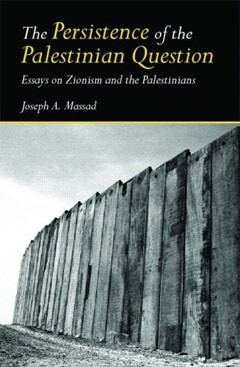The Electronic Intifada 31 May 2007

The Palestinian question is important enough to command attention in its own right: the politics of half a century have been moved by shockwaves from this epicenter of conflict. Massad offers invaluable information drawn from an array of carefully documented sources coupled with superb political and historical analysis that contributes directly to the study of Palestine.
The core of the work is a careful and compelling articulation of the interdependence of Palestinian and Jewish histories, especially manifest in the dual project of Zionism. Readers within and outside the academy have long recognized the centrality and intensity of the Zionist effort to reshape Jewish subjectivity, creating a “new Jew” to inhabit the anticipated Jewish state. The Israeli of their hopes was to be strong, willful, and landed, capable of self-determination, self-defense, and self-provision. The independence of the anticipated Israeli citizen, the new Jew, reflected an anticipated sovereignty, mastery over the land and its people. It turned on a double subjection: the disavowal of the landless, stateless Jews of the Europe, and of the Palestinians, who were assigned the attributes Zionists endeavored to strip from themselves. The Palestinian Arab became the European Jew: landless and stateless, bearing the traits that had marked the Jew as subject. Massad’s reading of the often harsh Zionist texts on Arabs, Mizrahi, and European Jews is careful, marked by scrupulous, well-supported scholarship, and presented with a calm generosity.
Massad’s work will be an invaluable resource to several fields in comparative politics. The conflicts and fault lines within Israeli politics are clarified by Massad’s mapping of the constellation of constructed genealogies upon which Israeli identities depend. Israeli perceptions of their “rough neighborhood” and the global order are clarified as well. Massad, along with Gil Anidjar, is forcing a reconsideration of European identity. The place of Jew and Arab in European discourse, the European imagination, and historical and contemporary European understandings of extant life-worlds, are all illuminated by these essays. Students of postcoloniality have learned to provincialize Europe; Massad reminds us of the presence of the European in the East and the Eastern. We can begin to chart the processes that give the Palestinian the forms and attributes of the galut, that make the once Eastern Jew the form of European presence in the East.
Studies of the malleability of subjects and subjectivity at a given historical and political site are rarely so attentive to the multiples dimensions on which identity is constituted and articulated. Massad attends to temporality, space, language, the collective, and the individual. His attention to sex, gender, and sexuality deserves special notice. Massad has no brief for the self-serving gender myths prevalent in Israel and Palestine. He details the sexing of race and nationality that informs European and Zionist discourses and Palestinian collaboration in the subjection of women as well as the more palatable forms of gendered and sexualized national discourses.
Theorists should read this book with particular care, for it enriches extant critiques of authenticity, extends the literature on identity, deepens ethical and political inquiries, and contributes to the revived concerns of political theology. Massad’s book shows how assigning traits of a rejected self to others permits the simultaneous preservation and rejection of a constitutive past. Memory figures in both Zionist and Palestinian narratives as offering the means of self-preservation and the promise of redemption, as an always ethical enterprise. Massad questions the ethical status of memory. In detailing the partial but decisive Zionist excision of religion from the figure of the Jew, Massad opens Marx’s Jewish question — the relation of the citizen, the theological and the political — once again.
Weber, at the close of Politics as a Vocation describes political work in a time of crisis as the “slow drilling through hard boards.” Those who work in Middle Eastern studies know the temptation to self-censorship and the costs that too often attach to honest scholarship in this field. I could not close this review without recognizing that this study demanded more than intellect of its author. Massad has shown what Weber called “that steadfastness of heart which can brave even the crumbling of all hopes” and maintained all the scholarly virtues in the face of this almost unanswerable demand.
Anne Norton, professor of political science and comparative literature at the University of Pennsylvania, is the author of Leo Strauss and the Politics of American Empire (Yale University Press, 2004) and other works.
This article was originally published in the Winter 2007 issue of the Journal of Palestine Studies and is reprinted with permission.
Related Links


